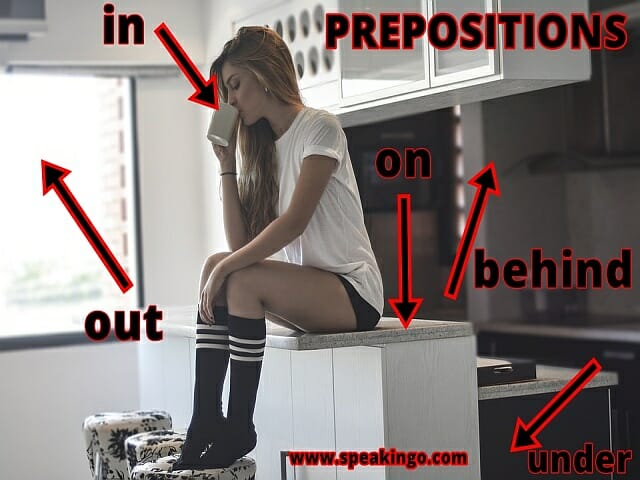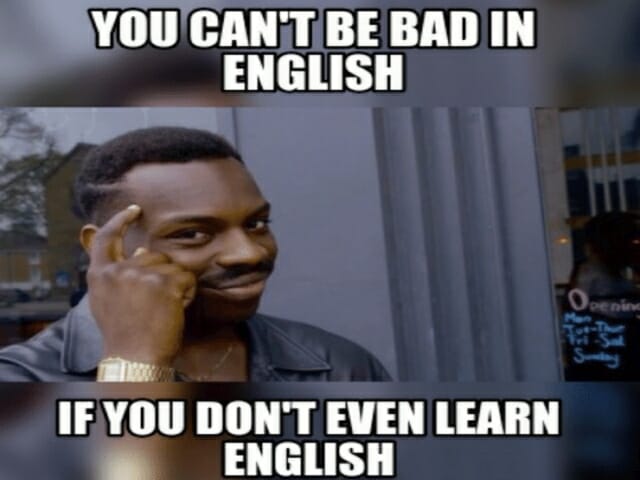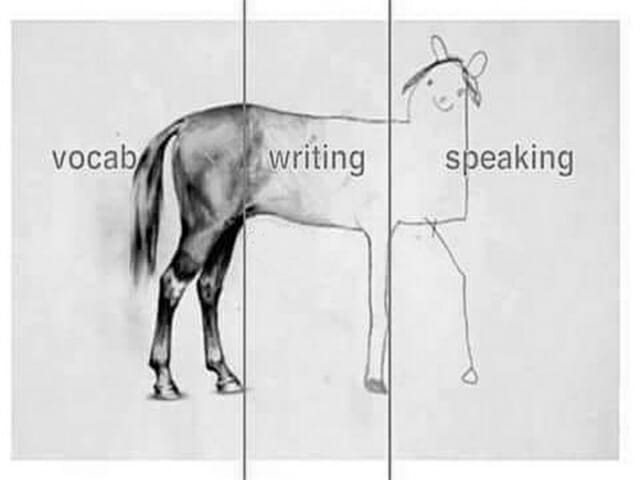Любое слово в любом языке не существует само по себе, оно должно сочетаться с другими словами. Английский язык не исключение, в нем это явление называется word collocation (сочетаемость слов). Как правило, у изучающих английский больше всего трудностей вызывает именно сочетаемость предлогов с разными частями речи, ведь она может сильно отличаться от сочетаемости в русском языке. Согласно исследованиям, прилагательное good – самое употребляемое в английском языке. В этой статье мы и рассмотрим, как употреблять good с предлогами at, with и for.
Как употребляются good at, good with и good for
Иногда слово может сочетаться с несколькими предлогами, от которых будет зависеть его значение. У прилагательного good есть множество значений, одно из них – знающий, умеющий, способный что-то делать. В этом значении good используется с предлогами at и with.
Разберемся, как употребляются эти предлоги:
- Good at = деятельность, практика.
Мы употребляем прилагательное good с предлогом at, когда человек умеет что-то делать хорошо, обладает какими-то практическими навыками и умениями. В таких случаях мы используем конструкции good at something и good at doing something.
Jason is good at baseball. – Джейсон хорошо играет в бейсбол.
She is not good at dancing. – Она не очень хорошо танцует.
He is good at learning physics. – Ему легко дается физика.
- Good with = инструмент, отношение.
Good with используется по отношению к людям и конкретным предметам, а не к областям знаний и сферам деятельности (как предыдущая конструкция). Это выражение значит, что мы знаем, как обращаться с чем-то или как ладить с людьми. В таких случаях мы используем конструкцию good with something/somebody.
Annie is good with children. She is so kind. – Энни хорошо ладит с детьми. Она такая добрая.
John is an accountant. He must be good with figures. – Джон бухгалтер. Он должен хорошо считать.
She is good with household appliances. – Она умеет обращаться с бытовой техникой.
Для большей наглядности приведем в качестве примера выражение to be good with one’s hands – хорошо работать руками. В этом выражении мы рассматриваем слово hands как инструмент, с помощью которого мы можем что-то сделать.
Hugh is good with his hands. He repaired a leaky faucet all by himself. – Хью хорошо работает руками. Он сам починил капающий кран.
- Good for = похвала, польза.
В данном значении good употребляем с предлогом for. Good for часто используется в выражении Good for you! (Молодец!, Рад за тебя!).
– I’ve passed the exam and got the best grade in the class. – Я сдал экзамен и получил лучшую оценку в классе.
– Wow, good for you! – Ух ты, молодец!If he wants to beat me out, well hey, good for him! – Если он хочет победить меня, ну что ж, удачи!
Другое значение good for somebody – полезный для кого-либо.
You work hard, a long vacation will be good for you. – Ты много работаешь, продолжительный отпуск пошел бы тебе на пользу.
Чертовски хорош: как усилить высказывание с good for, good at и good with
Из-за того что появился предлог, слово good не потеряло своего актуального значения: у него по-прежнему есть степени сравнения, с ним сочетаются другие слова.
Jerome is an Englishman, so he is better at cricket than at baseball. – Джером англичанин, поэтому он лучше играет в крикет, чем в бейсбол.
Ознакомьтесь с небольшим списком наречий, часто сопровождающих прилагательное good.
- Very good (not very good) – очень хорошо (не очень хорошо).
They are not very good at history of England. – Они не очень хорошо знают историю Англии.
- Really good (not really good) – действительно хорошо (не особо хорошо).
Healthy diet will be really good for you now. – Здоровое питание пошло бы тебе на пользу сейчас.
- Extremely good – невероятно, чрезвычайно хорошо.
He is extremely good with people. – Он чрезвычайно хорошо ладит с людьми.
- Fairly/Pretty/Quite good – достаточно, довольно хорошо
Ivy is fairly good at clay modelling. – Айви достаточно хорошо лепит из глины.
Прилагательное bad работает по тому же принципу, что и good. Мы можем сказать, что человек bad at something, если он плохо что-то делает, или использовать bad for somebody, если что-то окажется не совсем полезным для человека. Но с предлогом with прилагательное bad не используется.
He is extremely bad at saving money. – У него очень плохо получается копить деньги.
She is quite bad at math. – Она довольно плохо понимает математику.
Spending a lot of time in social media is bad for you. – Проводить много времени в социальных сетях вредно для тебя.
Теперь вы знаете все о прилагательном good с предлогами at, with и for. Не забудьте пройти тест, чтобы удостовериться, что вы отлично поняли эту тему.
Тест
Good at, good with и good for: выбираем правильный предлог
Если вы нашли ошибку, пожалуйста, выделите фрагмент текста и нажмите Ctrl+Enter.
Если мы в чем-то хороши или плохи, мы будем хвастаться этим на английском, используя предлог «at». Поэтому мы будем говорить, что мы good at или bad at something.
Как хорошо владеть английскими предлогами?
Английские предлоги — очень интересная тема, так как в них нет никакой логики!
Почему в русском языке мы должны говорить, что ты хорош «в» английском? Разве не логичнее было бы сказать, что вы хорошо владеете английским ,«на» английском или «в» английском?
Англичане решили, что они предпочитают быть хорошими «при» чем-то и поэтому не используют предлог «from», а «at» (при). Вот как-то так.
И когда мы говорим на английском, мы всегда должны помнить об этом!
На самом деле, лучше вообще не заморачиваться с правилами, а повторять целые предложения на английском! Таким образом, вы автоматически научитесь говорить по-английски правильно, вместо того, чтобы думать над каждым предложением!
Поэтому давайте лучше посмотрим, как это будет выглядеть на конкретных примерах.
to be bad at something
Something означает «что-то». Иногда в учебниках английского языка можно встретить сокращение sth. Таким образом, to be bad at sth означает «быть плохим в чем-либо».
Однако, в вежливой Англии, мы редко будем грубо говорить, что кто-то в чем-то плох. Если только в шутку или по незначительному поводу:
- Tom is bad at singing.
(Том плохо поет .)
- She is very bad at cooking.
(Она очень плохо готовит.)
- You are bad at planning.
(Вы плохи в планировании.)
not bad at
В то время как not bad at (неплох) по сути означает то же самое, что и good at (хорош).
- I’m not bad at languages.
(«Я неплох в языках», — сказал один известный полиглот).
to be good at something
Однако в английской культуре, мы гораздо чаще видим похвалу.
- She is very good at English.
(Она очень хорошо знает английский.)
- Is she good at dancing?
(Хороша ли она в танцах? или «хорошо ли она танцует?»).
- He isn’t very good at driving.
(Он не очень хорошо водит машину).
- We’re good at having fun!
(Мы умеем хорошо развлекаться!).
- I’m not very good at PE.
(Я не очень хорош в физкультуре).
- That girl is quite good at football.
(Эта девушка, в целом, неплохо играет в футбол).
Или, как поет (или, скорее, воет) Sam Smith:
- I’m way too good at goodbyes.
(Я слишком хорошо умею прощаться).
clever at something
Если вы хотите произвести впечатление, вместо good at something (хорош в чем-то), можете также сказать clever at something (в чем-то умен).
В основном они означают одно и то же ¹, например:
- She is clever at English.
(Она хороша в английском.)
- He is very clever at painting.
(Он очень хорошо рисует.)
А что между ?
Помимо отрицания «no good» (должно быть not good), как не совсем правильно поет Amy Winehouse в песне выше, наши good at и bad at мы также можем изменять наречиями.
Я бы сказал, что шкала (по возрастанию) выглядит следующим образом:
- fairly (достаточно),
- reasonably (разумно ),
- quite (достаточно),
- pretty («хорошо»),
- very (очень),
- extremely (чрезвычайно ).
Например:
- She’s extremely good at listening, very good at reading, quite good at writing and fairly good at speaking.
Good enough
Если что-то «достаточно хорошо», мы скажем:
- She’s good enough at climbing to try a higher mountain.
(Она достаточно хороша в скалолазании, чтобы попробовать забраться на более высокую гору).
Хотя эта фраза обычно используется с not:
- Я чувствую, что я недостаточно хорош в чем-либо…
(Мне кажется, что я ни в чем не достаточно хороша…).
Как хорошо владеть английским?
Ну, если хочешь слышать «You’re good at English!» все чаще и чаще, тебе нужно еще немного подтянуть свой английский (поскольку ты читаешь пост для начинающих).
Однако даже самый длинный путь всегда начинается с первого шага!
Просто запишитесь на крутые курсы английского языка, и вы не успеете оглянуться, как будете говорить как коренной англичанин!
Конечно, я рекомендую курс английского языка Speakingo, потому что этот практический курс английского языка научит правильно говорить, что обычно является нашей самой большой проблемой. И что интересно, вы учитесь, когда хотите и сколько хотите, совершенно без стресса, потому что здесь вы разговариваете со своим телефоном или компьютером, который вас понимает, хвалит и поправляет, если нужно.
Такое обучение не только быстрое и эффективное, но и простое и забавное!
Лучше всего зарегистрироваться и попробовать бесплатно в течение недели, чтобы понять, подходит ли тебе такой метод изучения английского языка!
Хорошо ли у тебя получается использовать такие слова, как good и bad at?
Если у тебя есть вопросы, не стесняйся задавать их в комментариях!
I am looking for a word or group of words to describe someone who just started doing something, but is already very good at it, or a beginner without faults. For example, it could be used in this sentence: «Although Mary had just started playing Tennis, she had already won 3 tournaments; Some could say she was a ______».
AndyT
14.7k5 gold badges49 silver badges71 bronze badges
asked Jun 14, 2018 at 2:39
9
You can use the word «natural» either as an adjective or as a noun, to describe the person and their skill or the person themself.
natural (adjective)
attributive (of a person) having an innate
skill or quality.
‘he was a natural entertainer’natural (noun) A person having an innate talent for a particular task
or activity.
‘she was a natural for television work’
Oxford
Living Dictionaries
Another is the word «gifted«.
Having exceptional talent or natural ability.
‘a gifted amateur
musician’
Oxford Living Dictionaries
If you want another noun describing the person, then «prodigy«
prodigy
often with modifier A young person with exceptional
qualities or abilities.
‘a Russian pianist who was a child prodigy
in his day’
Oxford Living Dictionary
More often than not prodigy is used with minors or children.
Sven Yargs
157k34 gold badges406 silver badges726 bronze badges
answered Jun 14, 2018 at 3:04
ZebrafishZebrafish
12.4k6 gold badges32 silver badges61 bronze badges
7
quick learner
«He was a pragmatist and quick learner. He was skilled at picking up ideas from others and making them his own.» (Lawrence M. O’Rourke, Row House to White House, 2012, p.3319)
«The quick learner has what is called in ordinary terminology, the power of concentration. All the available cerebral energy seems to participate in …» (William Henry Pyle — 1921)
«You had no experience as a woman, but you were full of spirit and a quick learner.» (Gary Jonas — 2011)
Also, fast learner
answered Jun 14, 2018 at 13:28
KrisKris
36.9k6 gold badges56 silver badges158 bronze badges
Although Mary had just started playing Tennis, she had already won 3 tournaments; she was a real talent.
talent (noun)
(someone who has) a natural ability to be good at something, especially without being taught
Source: Cambridge Online
answered Jun 14, 2018 at 10:42
2
If an adjective would suffice, I would say that she has a knack for tennis:
1 An acquired or natural skill at doing something.
‘he had a knack for communicating’
answered Jun 14, 2018 at 16:08
Chase SandmannChase Sandmann
8631 gold badge10 silver badges22 bronze badges
2
Depending on your context, you might call this person a whiz kid:
a young person who is outstandingly skillful or successful at
something.«a computer whiz kid»
answered Jun 15, 2018 at 0:54
Kevin WorkmanKevin Workman
11.3k1 gold badge26 silver badges38 bronze badges
In some contexts, the term rising star might be appropriate.
If Mary was dedicated to her tennis career, and it was understood that she was already gifted for a beginner and on the way to success, it could be used here.
From Merriam-Webster:
rising star: a person or thing that is growing quickly in popularity or importance in a particular field
From Cambridge:
rising star: a person who is likely to be successful
However, it wouldn’t be an appropriate term for something less important than a career or primary hobby — for example, if someone succeeded in their first cookery class, but wasn’t particularly dedicated to cookery, the term wouldn’t be appropriate.
answered Jun 15, 2018 at 11:21
LunaLuna
1312 bronze badges
Yet another option: wunderkind
answered Jun 15, 2018 at 3:01
Dave CostaDave Costa
2041 silver badge2 bronze badges
Prodigy works. The comments about prodigy only applies to children are not entirely true. BJ Penn was widely referred to as ‘the prodigy’ and he learned his craft after highschool.
answered Jun 18, 2018 at 0:23
Precocious is another possibility
answered Jun 18, 2018 at 17:15
1
In dancing we use «advanced Beginner»
answered Jun 14, 2018 at 14:47
Continue Learning about English Language Arts
What is another word for jerk?
To pull or tug at something
Another word for jerk can be imbecile or being rude
What is another word for job satisfaction?
being pleased with something
What is another word for doing something without being asked?
Dynasty!
What is another word to possess something?
another word for possess is «to have»
What is another word for strictly?
A good synonym for «strictly» is «stringently» or «meticulously»
depending on how the word is being used. A good antonym would be
«leniently» or «methodically,» once again depending on how the word
is being used.
-
#1
Hi everybody!
This is the first time I am participating in the forum, although I have been using wordreference for a long time. I am an English teacher and I always recommend this to my students, should I have kept my secret for me?
Ok, my question is the following; which one is the difference between «be good at» and «be good with»? I have always used be good at, like in «I am good at computers», but I have just heard that you can also say «good with», although it has different connotations. Could please help me?
Thank you so much in advance
-
#2
In general, «good at» is used with areas of expertise:
- Stephen Hawking is good at physics.
- Roger Federer is good at tennis.
- Elementary-school teachers have to be good at child psychology.
«Good with» is used with specific objects or people:
- Stephen Hawking is good with equations.
- Roger Federer is good with a tennis racquet.
- Elementary-school teachers have to be good with children.
The word «computers» can be treated as either an area of expertise or a set of individual objects. Therefore, it’s permissible to say either «good at computers» or «good with computers».
Welcome to the forum!
Another note: Gerunds fall into the «good at» category since they’re generalized actions:
- Stephen Hawking is good at understanding complex equations.
- Roger Federer is good at handling a tennis racquet.
- Elementary-school teachers have to be good at dealing with children.
mhp
Senior Member
-
#3
Hi everybody!
This is the first time I am participating in the forum, although I have been using wordreference for a long time. I am an English teacher and I always recommend this to my students. Should I have kept my secret to myself?Ok, my question is the following; What is the difference between «be good at» and «be good with»? I have always used «be good at,« like in «I am good at computers», but I have just heard that you can also say «good with», although it has different connotations. Could you please help me?
Thank you so much in advance
I agree with Salsamore, I just add: To be good at doing something.
PS. I see that Salsamore beat me to it
-
#4
I´m very grateful, Salsamore and Mhp, you have helped me so much! I will explain this to my students. Thank you again!
Last edited by a moderator: Jul 12, 2011
-
#5
Hi! And what about with this sentence:
«I’m good with numbers» — Is that correct??
Thanks!
obz
Senior Member
-
#6
«I’m good with numbers» — Is that correct??
![Tick :tick: :tick:]()
Good with + nouns.
Good at + verbs.
You’re good at remembering them / solving equations / etc.
But you’re good with numbers.
-
#7
I too have a question regarding to this topic.
Which is the correct answer?
I remember faces very well. I am ________________.
a.) good with faces
or
b.) good at faces
Cagey
post mod (English Only / Latin)
-
#8
You are good at remembering faces. At least that is what I would say.
I think it is a matter of custom. If you say that you are good with names, people will understand that you remember names well. However, if you say you are good with faces, we don’t know what you do with faces. Perhaps you know how to make up faces well, but there are other possibilities. We have the same problem with «good at faces.» In that case, it seems possible that you are good at drawing faces.
-
#9
…
However, if you say you are good with faces, we don’t know what you do with faces. Perhaps you know how to make up faces well, but there are other possibilities. We have the same problem with «good at faces.» In that case, it seems possible that you are good at drawing faces.
Would native speakers of English not say «he’s good with faces» or «he’s good at faces» at all?
-
#10
Would native speakers of English not say «he’s good with faces»
or «he’s good at faces»
at all?
However, in the context of an artist, for example, who paints different subjects, we could say that he is good at faces if he is particularly skilled at painting the likeness of people’s faces.
Ex.
John always recognizes people he has met before. He’s good with faces.
John loves to paint, and although he’s not very good at landscapes, he’s very good at faces.
-
#11
However, in the context of an artist, for example, who paints different subjects, we could say that he is good at faces if he is particularly skilled at painting the likeness of people’s faces.
Ex.
…John loves to paint, and although he’s not very good at landscapes, he’s very good at faces.
gengo’s explanation solved the puzzle. Now I understand it this way: in daily conversation without specific context, «he’s good at landscapes / faces» doesn’t make much sense. In cases where a specific context is given to provide an activity to the word «at», «at» could be followed by a noun, like «lsndscspes» or «faces». So, simply saying «he’s good at faces» is wrong doesn’t seem very fair.
Is there a context that could make «he’s good at numbers» sound good?
Last edited: Apr 11, 2016
-
#12
Is there a context making «he’s good at numbers» sound good?
Yes, it would be fine in the sense of «He’s good at [doing/calculating/handling/etc.] numbers.»
In some cases, either preposition could work, as I have demonstrated above. But there are other cases when only one or the other will work. Prepositions are probably the hardest thing about English, because we use them in so many different ways.
-
#13
Yes, it would be fine in the sense of «He’s good at [doing/calculating/handling/etc.]
…
But some native speakers in prevous posts have said it’s wrong. It’s a bit confusing.
How would you distinguish it from «he’s good with numbers»?
Last edited: Apr 11, 2016
-
#14
Like I said in #12, there are times when both prepositions work, and with «numbers,» I think both work. With «at» we are referring to the skill of doing calculations, and with «with» we are referring to the numbers themselves. As you can see, there is little difference between those two, which is why both prepositions work and have basically the same meaning in this case.
I can see why this would be confusing to English learners.
BTW, sunyaer, your English is really good.
-
#15
Like I said in #12, there are times when both prepositions work, and with «numbers,» I think both work. With «at» we are referring to the skill of doing calculations, and with «with» we are referring to the numbers themselves.
Please see post # 20 in this thread good with / good in / good at
-
#16
Please see post # 20 in this thread good with / good in / good at
That wouldn’t be the first time I’ve disagreed strongly with another native speaker about something. I’m sorry, but that is just wrong, in my opinion. Google «he’s good at numbers» and read some of the examples. Again, «with» is much more common, but there is nothing incorrect about «at.»




